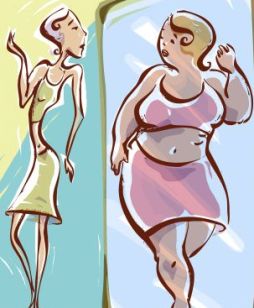Anorexia is a serious eating disorder. People that suffer from this condition are obsessed about their weight and often have a distorted image of their own body.
According to the United States Surgeon General, eating disorders such as anorexia can be chronic and sometimes life-threatening. People who suffer from anorexia symptoms have a deep emotional fear of weight gain.
 This psychological condition has a high mortality rate compared to other mental disorders.
This psychological condition has a high mortality rate compared to other mental disorders.
The US Surgeon General advised that more people die from anorexia than almost all other mental disorders.
Risk Factors and Causes
The exact cause of anorexia is unknown. Anorexia is more common in females than males. About 3% of the female population can be affected by anorexia at some time of their lives.
Who Does Anorexia Affect?
Anorexia is more common in adolescents and adults. According to the Mayo Clinic, teenagers can suffer from the disorder due to the biological changes of their bodies during puberty.
Another frequent cause of anorexia in teens is sometimes attributed to constant bombardment by the media of skinny models and actors. Some teenagers equate images of these people to success in life or popularity. This can lead them to go to extremes in order to try to look like what they see on television.
Anorexia is also sometimes caused from certain sociological situations such as: divorce, relationship changes, change in schools and other transitional situations that may cause sudden emotional distress.
Genetics can also play a role in the development of anorexia. Females that have parents or siblings who suffer from anorexia symptoms are susceptible to the disease.
Causes of Anorexia
Psychological
Most people with anorexia symptoms suffer from psychological distress. This condition can sometimes be related to excessive compulsive behaviors.
Biological
According to the Mayo Clinic, an increased risk of anorexia can be linked to chromosomes in certain genetic occasions. This research has revealed that anorexia can often run in families.
Cultural
Peer pressure to be thin, particularly among adolescents, can be a trigger in some cases of anorexia. If a young girl is overly upset about her appearance and is predisposed to some of the other risk factors, she can be negatively influenced by society’s infatuation with the “perfect body.”
Anorexia Symptoms
Anorexics often go through extreme measures to lose weight. Sometimes, they exercise excessively, while starving themselves. They may also binge and purge. They do this by vomiting after eating. Misuse of enemas and laxatives are also common.
This dangerous behavior can lead to fatigue, weakness, dehydration, irregular blood count and a whole host of other physical problems.
There are some emotional signs to look out for if you suspect that a loved one may have anorexia. Typical characteristics include the following: depression, preoccupation with appearance, over use of diuretics, withdraw, excessive exercise combined with the refusal to eat, and a false sense of their own weight.
Treatment Options
After a loved one has been diagnosed with anorexia symptoms, it’s time to take the necessary steps to combat this debilitating condition. The first step of getting somebody to recognize that they suffer from this condition is often the hardest.
Psychological Treatment
The underlying cause of this disorder is due to deep emotional issues; therefore, it is crucial that a licensed mental health professional gets involved early on with the patient.
A psychiatrist can treat psychological issues of low self-esteem and anxiety, which are often associated with this disorder. The treatment plan may include psychotherapy, behavior therapy and in extreme cases the use of medication. Antidepressants can calm anxiety and depression in some anorexics, notes the National Institute of Mental Health.
Diet
A healthy weight is vital for recovery. Anorexics are typically characterized as being less than 85% of their desired body weight. This extremely low body weight can lead to death if not properly treated.
A well structured diet will assist the patient in gaining healthy weight. The diet plan should include the following foods:
- Fruits and vegetables
- Whole grains such as wheat bread, brown rice and whole grain pasta
- Fish such as salmon, tuna and halibut
- Nuts, seeds, olive oil
- Low-fat dairy products
- Lean meat and poultry
Along with the proper foods, it is important to have the patient eat at regular times throughout the day. Keep a chart or journal to track the progress of the meal plans. Also, encourage healthy snacks in between meals.
Bottom Line
Anorexia symptoms can be successfully treated with proper diagnosis, psychological treatment and a carefully outlined eating program. Another key factor to the overall success is the development and maintenance of a long-term plan.
The goal of this plan is to pre-program the patient to ultimately feel a stronger sense of self-worth. This positive outlook will help reverse the negative behavior that is associated with anorexia.






